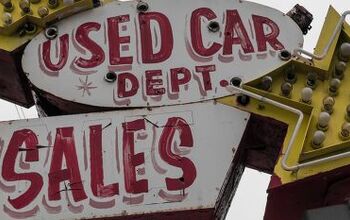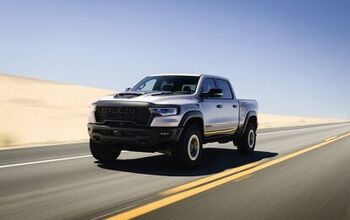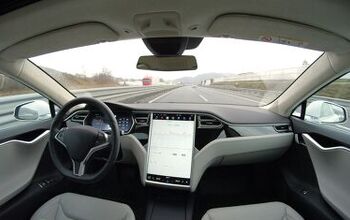QOTD: Best Bare-bones Escape Capsule?

The pursuit of safety can lead an individual down many paths. To a self-defense course. To a gun store. To a withdrawn, frightened existence well removed from the warm confines of relationships and social gatherings. And even to a car dealership.
Yes, owning and driving a car puts you more at risk of dying in a crash than riding the train or bus to work every morning, but in these strange times, a car can be more than just a convenient way to get to work on time (or not). It can be a sanctuary.
Say you want just such a sanctuary. You’re not picky. You don’t want to buy a used jalopy from someone who’s holding back the truth. But you’re not exactly loaded.
Data is piling up that the global populace is ready and willing to change their ways and get behind the wheel of a car — often for the first time — in order to physically distance themselves from the ongoing coronavirus pandemic. It stands to reason, yet it might not come to pass. However, let’s put all that aside for now.
YOU are now in the shoes of this scared, safety-seeking individual. And you’ll feel especially safe in a vehicle with a warranty, hence your need to buy something with zero miles on the odometer. Now, getting into debates about wildly variable credit scores and financing a bigger vehicle at a lower rate will muddy this exercise, so let’s make some ground rules.
Given your desire for a warranty and new-car smell, the vehicle you’ll be looking for is new. And you’ll be looking to have it satisfy as many needs and desires as possible. You’re still you. However, your price cap in a measly $20k. That’s after destination, but not before tax, admin, other fees, etc. You can cross that MSRP threshold by a handful of dollars, but not a grand or more.
Pretty small list, eh?
Certain auto journos bemoan the death of cheap cars, but they’re still out there, and a vanishing few of these hectoring voices ever actually put their money towards one. If the under-35 crowd really does desire a personal vehicle more than ever before, surely there’ll be an uptick in sales on the affordable end of things. Time will tell.
So let’s hear your pick. There’s a couple of not-hot hatch holdouts in the form of the Chevrolet Spark and Mitsubishi Mirage. The Ford Fiesta’s gone, sadly. Moving up, there’s a new Nissan Versa, and the even fresher Sentra also makes the cut in base form. Hell, Nissan’s Kicks is a contender. So is the entry-level Chevrolet Trailblazer, for that matter. Hyundai and Kia have product they’d like to parade in front of your eyes.
It’s not High Country or King Ranch territory, but it isn’t Trabant, either. What’s it gonna be, B&B?
[Image: Hyundai]

More by Steph Willems
Latest Car Reviews
Read moreLatest Product Reviews
Read moreRecent Comments
- Dartdude Having the queen of nothing as the head of Dodge is a recipe for disaster. She hasn't done anything with Chrysler for 4 years, May as well fold up Chrysler and Dodge.
- Pau65792686 I think there is a need for more sedans. Some people would rather drive a car over SUV’s or CUV’s. If Honda and Toyota can do it why not American brands. We need more affordable sedans.
- Tassos Obsolete relic is NOT a used car.It might have attracted some buyers in ITS DAY, 1985, 40 years ago, but NOT today, unless you are a damned fool.
- Stan Reither Jr. Part throttle efficiency was mentioned earlier in a postThis type of reciprocating engine opens the door to achieve(slightly) variable stroke which would provide variable mechanical compression ratio adjustments for high vacuum (light load) or boost(power) conditions IMO
- Joe65688619 Keep in mind some of these suppliers are not just supplying parts, but assembled components (easy example is transmissions). But there are far more, and the more they are electronically connected and integrated with rest of the platform the more complex to design, engineer, and manufacture. Most contract manufacturers don't make a lot of money in the design and engineering space because their customers to that. Commodity components can be sourced anywhere, but there are only a handful of contract manufacturers (usually diversified companies that build all kinds of stuff for other brands) can engineer and build the more complex components, especially with electronics. Every single new car I've purchased in the last few years has had some sort of electronic component issue: Infinti (battery drain caused by software bug and poorly grounded wires), Acura (radio hiss, pops, burps, dash and infotainment screens occasionally throw errors and the ignition must be killed to reboot them, voice nav, whether using the car's system or CarPlay can't seem to make up its mind as to which speakers to use and how loud, even using the same app on the same trip - I almost jumped in my seat once), GMC drivetrain EMF causing a whine in the speakers that even when "off" that phased with engine RPM), Nissan (didn't have issues until 120K miles, but occassionally blew fuses for interior components - likely not a manufacturing defect other than a short developed somewhere, but on a high-mileage car that was mechanically sound was too expensive to fix (a lot of trial and error and tracing connections = labor costs). What I suspect will happen is that only the largest commodity suppliers that can really leverage their supply chain will remain, and for the more complex components (think bumper assemblies or the electronics for them supporting all kinds of sensors) will likley consolidate to a handful of manufacturers who may eventually specialize in what they produce. This is part of the reason why seemingly minor crashes cost so much - an auto brand does nst have the parts on hand to replace an integrated sensor , nor the expertice as they never built them, but bought them). And their suppliers, in attempt to cut costs, build them in way that is cheap to manufacture (not necessarily poorly bulit) but difficult to replace without swapping entire assemblies or units).I've love to see an article on repair costs and how those are impacting insurance rates. You almost need gap insurance now because of how quickly cars depreciate yet remain expensive to fix (orders more to originally build, in some cases). No way I would buy a CyberTruck - don't want one, but if I did, this would stop me. And it's not just EVs.


































Comments
Join the conversation
I would rather opt for a bicycle. Bare-bones escape - yes, capsule -not, but I do not want to be squeezed into capsule.
My wife bought a new 2018 Spark to commute with after grad school. I absolutely love that car. It doesn’t do anything particularly well except fit into small spaces. But it does everything you ask of it without complaint. It looks comical and brings a smile to my face. I will miss that car when it comes time to part ways with it. It has a personality that is absent from other cars, and I love it for that onsite of its flaws.